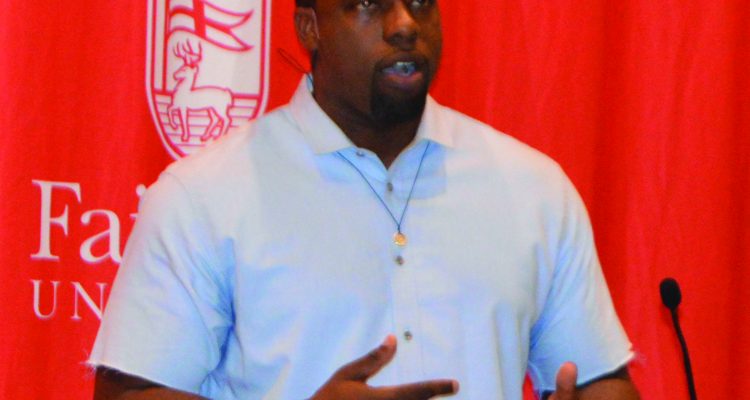A single choice in how you react to an unforeseen obstacle in life can make all the difference moving forward. That was the takeaway Brian Banks, a man wrongfully imprisoned, wanted students to gain from his speech on March 1.
Students gathered in the Lower Level of the Barone Campus Center to hear Banks recount his life story. Banks was wrongfully accused of kidnapping and rape in 2002 at only 17 years old, forfeiting a full ride to play football at the University of Southern California and spending five years of his life in prison.
Despite no DNA evidence and numerous revisions of the victim’s story, Banks chose to take a plea for five years probation and registering as a sex offender anywhere he lived for the rest of his life rather than potentially facing up to 40 years in prison.
“I was out of jail, but I wasn’t free,” Banks recounted. “I was charging a GPS monitor two hours in the morning and two hours at night before curfew. I was still a prisoner.”
After his accuser tried to reconnect with him on Facebook nearly 10 years later, Banks recorded a meeting between the two and procured a confession proving his innocence. He brought the recordings to the California Innocence Project, an organization that reviews thousands of criminal cases each year in an effort to free wrongfully imprisoned men and women. A year later on May 24, 2012, Banks was cleared of all his charges.
After practicing at a summer camp with the Seattle Seahawks and playing four games with the Atlanta Falcons, the 28-year-old fulfilled a childhood dream that had been taken from him.
“I didn’t want a career in pro football, it was just about accomplishing this dream I always had and just playing a few games in the NFL was literally a dream come true,” said Banks.
Two FUSA members and Program Coordinators of Cultural and the Arts Events, Matthew Marshall ‘19 and Olivia McEvoy ‘19, reached out to Banks to be a speaker.
“He had a great story about redemption and has a great message to give students about the culture surrounding prison and life in general,” said Marshall.
A certified life coach and motivational speaker, Banks uses his influence to speak out against wrongful convictions and what he sees as a silent epidemic in America’s criminal justice system. For him, his story is just one of many in a long line of racially motivated and unjust convictions in America.
“It’s still slavery, to me, like they couldn’t force us to do free labor anymore so instead they just decided to take as many as they could off the streets and use labor as a punishment,” said Banks.
He also cited the power of choice every individual has in their life. Recounting the day of his epiphany in prison, Banks described how he chose not to let his accuser or what happened to him keep him angry at the world. He devoted his life in prison to doing everything he could to become a better person.
“Once you realize you are not in control of your situation, you realize it isn’t the experience that affects you, it’s how you react to it,” he said.
Banks said rather than remaining bitter about the 10 years of his life that he lost, he chose to use his story to help bring attention to problems in the American justice system. He hopes a documentary series he is filming that looks at cases of wrongful convictions will help make the system, “work the way it is supposed to. To be fair and equal.”
Students reacted positively to Banks’ speech.
“I thought it was very moving, and I’m shocked how positive he is after what happened to him,” stated Jaclyn Russo ’19.
Senior Mary Calabro had a similar reaction, saying, “His story is so sad. It really is shocking to hear how some of these things can happen to people and you don’t hear about it until after the fact.”


Leave a Reply